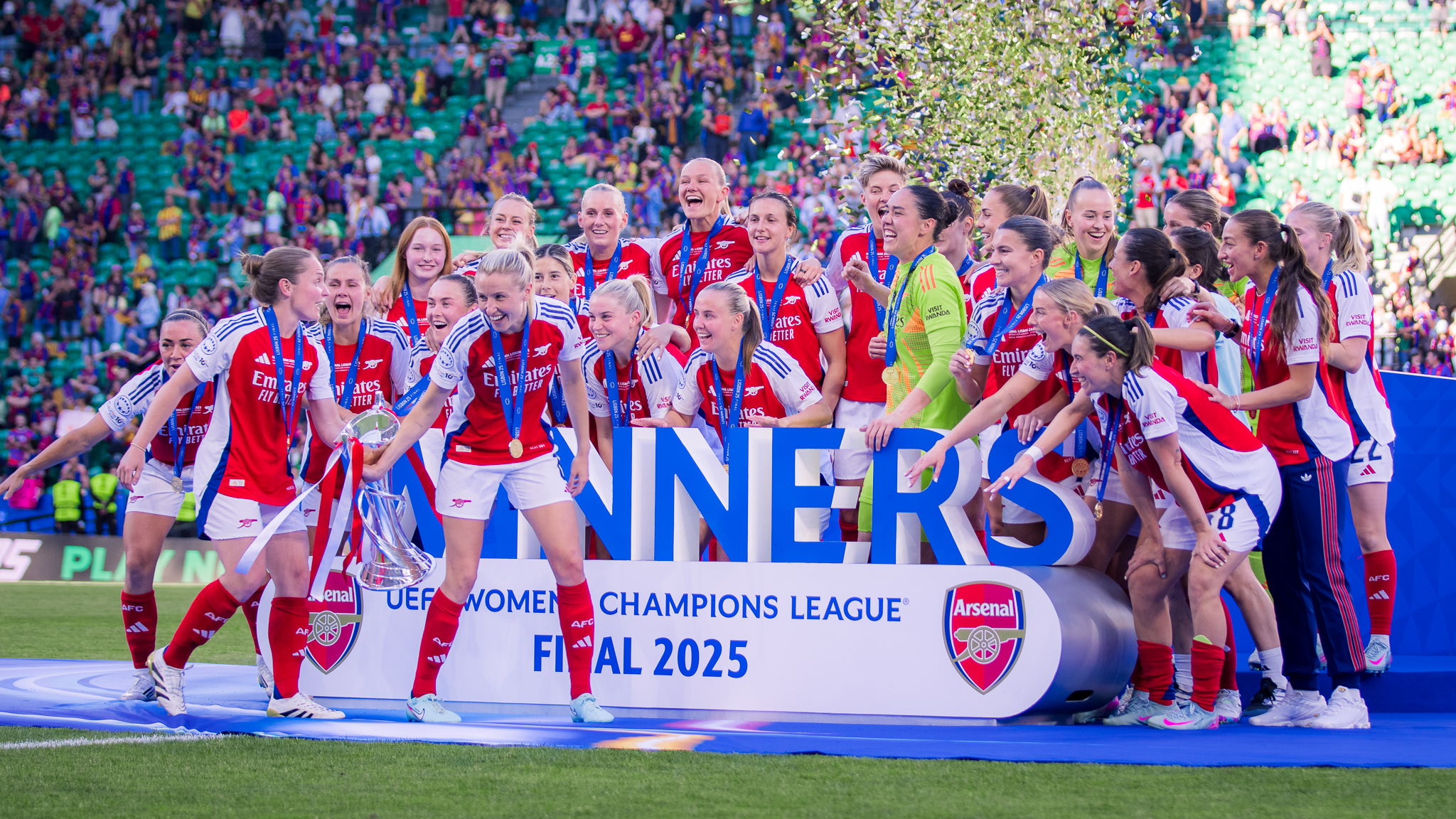“It’s Arsenal…Champions of Europe…”
Cheers, screams and tears of joy filled the Estádio José Alvalade Stadium as the final whistle was blown, and Arsenal’s historic Champions League victory was confirmed. Arsenal, who cemented their status as the only English team to win the UEFA Women’s Champions League (UWCL), had done the unthinkable: they had beaten the European giants Barcelona, to win their first UWCL title in 18 years.
Arsenal’s victory adds momentum to the growth of women’s football in England:
Historic victories have often been catalysts for growth in support and media coverage of women’s football in England. The Lionesses’ Euro 2022 victory was a prime example: since the final whistle we have seen exponential growth in attendance of WSL games, as well as media coverage of women’s football, and investment, which has led to huge developments in the sport in England. The celebrations that followed Arsenal’s victory are just one manifestation of this growth. Fans had to arrive at the Emirates hours early for the trophy lift on Monday 26th May, to ensure they could attend the 10,000-capacity event, with 4,500 Arsenal fans also travelling to Lisbon for the UWCL final.
When we compare those figures, as well as Arsenal’s attendance records over the past few seasons, to the attendance of 8,705 in Arsenal Women’s first ever game at the Emirates Stadium in 2021, it is evident that support for Arsenal Women has grown exponentially. This is the case for many WSL teams, with increases in attendance and coverage of women’s football games in England demonstrating the impact of the Lionesses’ victory in support for the women’s game. Hence, the number of supporters celebrating Arsenal’s win demonstrates how much women’s football has grown in England since 2022, and Arsenal’s victory only adds to this momentum.
Arsenal demonstrated that English teams can compete with the very best in the world
Arsenal’s win was also significant because it demonstrates that English teams can compete with the very best in the game, and this will be another lasting impact of their victory. The last time an English team won the UWCL was in 2007, when Vic Akers led his Arsenal team to victory, and they lifted the UEFA Women’s Cup trophy at Meadow Park, Borehamwood. In the 18 years since, Lyon have lifted the trophy the most, with Barcelona also being dominant in the competition.
Arsenal’s victory stands out because it demonstrates that English teams are able to compete with the teams who have consistently been the best in the world in women’s football. This places England and English football at the heart of the development of women’s football more globally.
During DAZN’s commentary of the final, co-commentator, Courtney Sweetman-Kirk said:
“This isn’t just what it means for Arsenal, it’s about the WSL, about English football, where that’s going. It’s been 18 long years since that trophy, that Champions League trophy, has been in the hands of an English team.”
Sweetman-Kirk’s words highlight the significance of Arsenal’s win for English football, and showing that the best women’s teams in England can compete with the best in the world.
Investment in women’s football can lead to trophies
Finally, Arsenal’s win also highlights the importance and impact that investment from clubs into their women’s team can have. Arsenal have consistently invested in their women’s team, and attendances for their WSL and UWCL games have consistently grown as a result. Since the 2019 World Cup, they have gradually increased the number of games being played at the Emirates Stadium each season, which led to the stadium being named as the main home of Arsenal Women in the 2024/25 season. They played eight WSL games at the stadium, alongside all of their UWCL home fixtures, with their domestic cup fixtures being played at the Mangata Pay UK Stadium (Meadow Park, Borehamwood). They have also sold-out the Emirates Stadium on multiple occasions. In 2024, they officially sold out Emirates Stadium for back-to-back WSL fixtures for the first time, after selling out the stadium for the first time in their UWCL semi-final against Wolfsburg in 2023.
This is one example of how Arsenal have demonstrated their investment in the women’s team, and have become known for their one-club mentality. The investment was evident at the UWCL final, with Arsenal co-owner Josh Kroenke in attendance, as well as executive vice-chair Tim Lewis, managing director Richard Garlick and director of women’s football Clare Wheatley. This is a significant contrast to other stories of the 2024/25 season, such as the absence of Manchester United’s owner Sir Jim Ratcliffe at the Women’s FA Cup final earlier this month.
Arsenal’s victory shows how this investment can pay off for clubs, for their players, staff, owners, and fans. Arsenal’s Champions League victory highlights the importance of investment in women’s football, and what memorable moments and victories it can lead to, with gradual and consistent investment.
Arsenal’s UWCL win was important and historic for many reasons, and the long-lasting impact for women’s football in England will be significant. The seasons following the Lionesses’ Euro 2022 victory illustrate how influential their win was for women’s football, and Arsenal’s win could add to this pre-existing momentum. Arsenal are also the first team to have won the competition after entering in the qualifying stages, and their victory shows that the best of the WSL can compete on the biggest stage, against the giants of women’s football. Arsenal have also been praised for their consistent investment in Arsenal Women, and their win displays the effects that investment can have.
The final whistle in Lisbon was a monumental moment, not just for Arsenal and the fans, but for women’s football in England.



